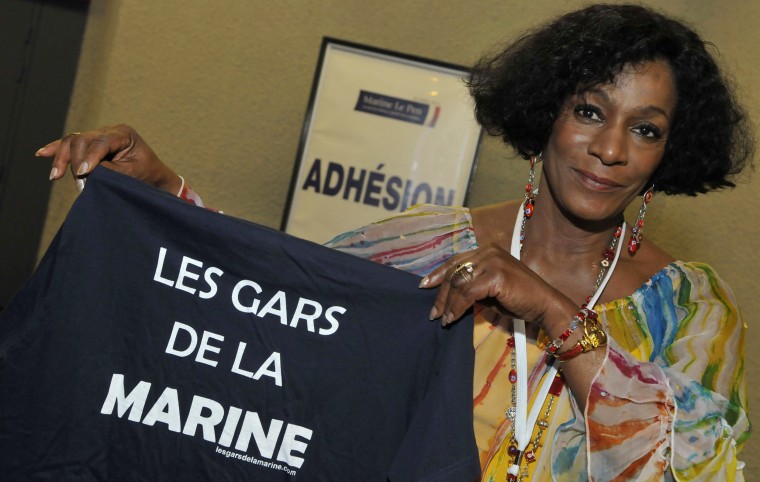At first glance, Huguette Fatna does not fit the typical profile of a National Front stalwart.
After all, the far-right, nationalist political party in France, which has long had to fend off accusations of racism, anti-Semitism and xenophobia, could be close to gaining more power should its leader, Marine Le Pen, be elected to the French presidency.

Enter Fatna, who is originally from the French territorial island of Martinique who over the years has been as a party point person on French overseas territories, in addition to being a regional adviser for the Alsace and Île-de-France regions. She is part of a cadre of female National Front supporters whose efforts have helped the hard-right in the closely watched upcoming French presidential runoff.
Related: Marine Le Pen: Far-Right Scion Who Could Become First Female French President
However, Fatna is not part of the newest wave of far-right populism that’s swept across Europe over the past few years. Rather, the divorced mother of one has been a party loyalist since becoming a member in 1981 and is currently a member of its political bureau and central committee.
Fatna’s first encounter with party founder Jean-Marie Le Pen in Martinique occurred at a contentious time in French history — at the height of a presidential election. After Socialist Party candidate Francois Mitterrand was elected president of France in 1981, he made the controversial decision to include members of the Communist Party as part of his governing coalition.
Related: France’s National Front Finds Support Among Millennials
Her affection for the party deepened after Jean-Marie’s daughter, Marine, visited the island in 1987 in place of her father, those familiar with the relationship said.
And while Fatna is godmother to Marine Le Pen’s younger daughter, Mathilde, and close to the Le Pen family, it’s difficult to tell how much decision-making authority she has within the party, those familiar with the party veteran said.
“Whenever I saw Fatna or previously [Farid] Smahi at headquarters or at events, it always struck me that they had something of a ‘trophy’ value, an easy visual means of refuting the charge of being a racist party,” James Shields, a professor at Aston University and author of "The Extreme Right In France: From Pétain to Le Pen" told NBC News.
Fatna did not respond to NBC News' requests for comment.
Related: French Elections: Marine Le Pen Is Backed by Quiet Army of Women
In a 2012 book on Marine Le Pen by French journalists Caroline Fourest and Fiammetta Venner, Jean-Claude Martinez, who served for many years as a vice president of the party, said he was pressured into hiring Fatna as a European parliamentary assistant. Martinez agreed, but claimed that Fatna didn’t show up to work and instead spent her time serving as a nanny to Marine Le Pen’s children — which Fatna has denied, claiming that she was allowed to work remotely.
“The fact that Fatna is from Martinique is important … they identify strongly with France, and they also have a tendency to reject racial identification,” said Tyler Stovall, the dean of humanities at the University of California Santa Cruz, and co-author of "Black France/France Noire: The History and Politics of Blackness".
Stovall says that when the Representative Council of France’s Black Associations was created in 2005, “the strongest opposition to the group came from people of Caribbean origin, many of whom rejected the idea that they had anything in common with blacks from Africa or elsewhere because of the color of their skin.”
Fatna, for her part, has not shied away from speaking out on social issues relating to race and immigration.
In a 2016 press release, Fatna blamed protests on the French island of Mayotte, off the eastern coast of Africa, primarily on what she called the local government’s generosity towards illegal immigration, referring to the protesters as "thugs" primarily of foreign origin.
A few years earlier in 2014, Fatna slammed the jailing of former party candidate Anne Sophie Leclere as a result of a 2013 Facebook post in which Leclere compared then Justice Minister Christiane Taubira, who’s originally from French Guiana, to a monkey.
“We have no freedom of speech here,” Fatna told Al-Jazeera America at the time. “We call ourselves democratic — we should have freedom of speech.”